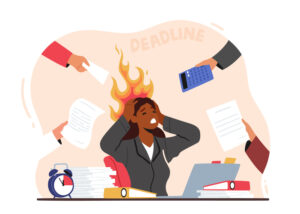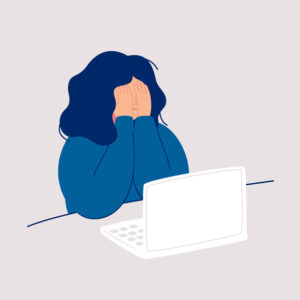Workplace stress is something most of us have experienced at some point, whether it’s a tight deadline, a demanding boss, or just feeling out of place. It’s a part of life that can sneak up on us, leaving us drained and frustrated.
What’s Causing All This Stress?
There are some usual suspects:
- Too Much on Your Plate: We’ve all been there—juggling more tasks than we can handle. When your to-do list keeps growing and the hours in the day stay the same, it’s no wonder stress creeps in.
- Feeling Out of Control: It’s tough when you feel like you have no say in how your work gets done. When decisions are made without your input, it can make you feel powerless and stressed.
- Worrying About Job Security: In today’s world, job security can feel like a luxury. If you’re constantly worried about layoffs or your position being cut, that anxiety can take a toll on your mental health.
- Struggling with Work-Life Balance: If you’re finding it hard to keep work from taking over your personal life, you’re not alone. Long hours and lack of downtime can lead to burnout.
- Clashing with Colleagues: Not getting along with co-workers or feeling unsupported can make going to work feel like a chore, adding to your stress.
- The Personality-Job Mismatch: Imagine being a creative person stuck in a rigid, rule-driven job, or a social butterfly in a role that requires you to work alone. This disconnect can create a kind of internal friction known as cognitive dissonance, where your job just doesn’t align with who you are, making every workday a little more stressful.
The Impact of Stress on Your Life
- Your Body Takes a Hit: Stress doesn’t just mess with your head; it affects your body too. Headaches, heart problems, stomach issues—stress can be behind them all (American Psychological Association, 2020).
- Mental Health Struggles: When stress sticks around for too long, it can lead to more serious issues like anxiety, depression, or burnout. It’s like your mind’s way of waving a red flag.
- Your Work Suffers: Stress can mess with your focus, memory, and decision-making. if you’re feeling less productive or making more mistakes than usual, stress might be the culprit.
- More Sick Days: Stress-related health issues can lead to more days off work. And if the stress is bad enough, you might even start thinking about quitting.
- Relationships Get Strained: Stress doesn’t stay at work—it follows you home. It can affect your relationships with loved ones, making you more irritable or distant.
Understanding Cognitive Dissonance and Stress (Festinger, 1957)
Cognitive dissonance is a fancy term for the uncomfortable feeling you get when your job doesn’t line up with your values or personality. Think of it like wearing shoes that don’t fit—no matter how hard you try, you can’t make them comfortable. This mismatch can make your work feel more stressful than it needs to be.
For example, if you’re a free spirit who values creativity but you’re stuck in a job with strict rules and little room for innovation, you’re likely to feel stressed and dissatisfied. Over time, this dissonance can build up, making you dread going to work each day.
What Can You Do About It?
- Get a Handle on Your Time: Good time management can do wonders for your stress levels. Try breaking your work into manageable chunks, setting realistic goals, and making sure to take breaks to recharge.
- Reach Out for Support: Don’t be afraid to talk about your stress. Whether it’s with your boss, a co-worker, or a friend, sometimes just getting it off your chest can make a big difference. And if you need more help, a mental health professional can provide valuable support.
- Practice Mindfulness: Techniques like mindfulness meditation, deep breathing, or yoga can help you stay calm and centered, even when work gets hectic (Kabat-Zinn, 2013).
- Take Care of Yourself: Eating right, exercising, and getting enough sleep can make you more resilient to stress. Plus, physical activity is a great way to blow off steam after a tough day.
- Find the Right Fit: If you suspect that a personality-job mismatch is behind your stress, it might be time to think about a change. Finding a role that aligns with your values and strengths can make work feel a lot less stressful and a lot more rewarding.
- Protect Your Personal Time: Work-life balance isn’t just a buzzword—it’s crucial for your well-being. Set boundaries, take time off when you need it, and make sure you’re spending time doing things you enjoy outside of work.
- Keep Learning: Building new skills can boost your confidence and make you feel more in control of your career. Plus, it can open up opportunities that might be a better fit for your personality.
Final Thoughts
Workplace stress is something we all face, but understanding where it comes from can help us manage it better. By finding ways to align your work with your personality, taking care of yourself, and reaching out for support, you can break the cycle of stress and start enjoying your work—and your life—a little more.
Take care of yourself out there, and remember: it’s okay to put your well-being first.
Author: Linh Nguyen, B. Psychology (Hons), M. ClinPsych
Linh is a General Psychologist at Vision and M1 Psychology. Her educational background includes a Bachelor of Psychological Science (Hons), and she has completed her Postgraduate Master’s Degree in Clinical Psychology.
To make an appointment with Linh Nguyen try Online Booking. Alternatively, you can call M1 Psychology Loganholme on (07) 3067 9129.
References
American Psychological Association. (2020). Stress in America™ 2020: Stress in the time of COVID-19. https://www.apa.org/news/press/releases/stress/2020/report
Festinger, L. (1957). A Theory of Cognitive Dissonance. Stanford University Press.
Kabat-Zinn, J. (2013). Full Catastrophe Living: Using the Wisdom of Your Body and Mind to Face Stress, Pain, and Illness. Bantam Books.


